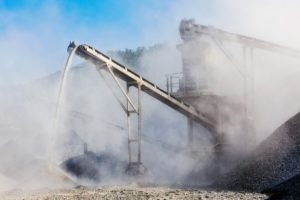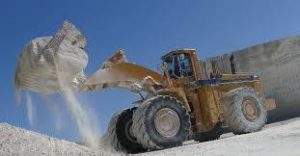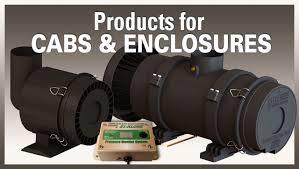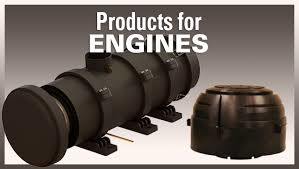2021 Industrial and Heavy Equipment Air Filtration Best Practices and Trends
 Air quality has been a trending topic throughout 2020. This focus will continue into 2021 due to the ongoing impacts of COVID-19 and increased interest in health and safety impacts of respirable particulates, viruses, and other microscopic nanoparticles.
Air quality has been a trending topic throughout 2020. This focus will continue into 2021 due to the ongoing impacts of COVID-19 and increased interest in health and safety impacts of respirable particulates, viruses, and other microscopic nanoparticles.
The rising financial impact and safety risks of dust
Although small, dust particulates can cause big problems on mine sites. Dust can damage equipment and pose a health risk to workers when it enters heating, ventilation and air conditioning (HVAC) systems.
Dust can block HVAC evaporator cores, resulting in expensive repairs and machines being taken offline for extended downtime, impacting a mine’s productivity.
Worse still, dust particulates can have a harmful impact on mineworkers’ health. When operators in machine cabins or control rooms breathe in contaminants too small to see, including coal and silica dust, diesel particulate matter (DPM), or asbestos fibre, this can lead to long-term and life-threatening illnesses such as silicosis or coal workers’ pneumoconiosis (CWP), also known as black lung.
“In industries where particulate matter is prevalent, investment in clean air systems is good for the health of machine operators and for the business,” Sy-Klone vice president of marketing and business development Austin Browne tells Australian Mining.
“Minimizing dust through advanced air filtration and pre-cleaning allows machines to run longer and employees to operate more safely.”
New international mining air quality standard introduced
ISO 23875: Operator enclosures – Air quality control systems and air quality performance testing was approved internationally in November 2020. The new standard adopts critical updates in engineering and performance requirements for operator enclosures on mine sites. ISO 23875 is a lifecycle standard, addressing cabin air control systems from initial design and throughout the machinery’s operating life.
Ten mining countries, including Australia, collaborated in the development of ISO 23875. Various Australian mining, governmental and industrial hygiene related organizations commented on the standard during its development. Sy-Klone International executive vice president Jeff Moredock was the international project lead for ISO 23875.
“This standard will make a huge difference in operator health and safety and how industry stakeholders address this issue around the world,” Moredock says.
ISO 23875 requirements include enhanced filtration efficiency requirements, defined maximum carbon dioxide (CO2) levels, real-time operator cabin monitoring and other key areas of cabin design, maintenance, and testing.
Increased demand for more efficient HEPA filters
COVID-19 has raised awareness of the importance of air quality, deepened understanding of airborne nanoparticles and broadened interest in high-efficiency filtration.
“We are increasingly receiving requests for HEPA-grade cabins, which is a customer reference to a properly-sealed operator cabin with HEPA filtration used in both the fresh and recirculated air systems, consistent with filtration mandates in occupational health and safety regulations, including ISO 23875,” LSM Technologies managing director Peter Woodford says.
“Our team has developed the expertise to engineer, design and service custom installations featuring the Sy-Klone RESPA system with HEPA filtration whilst maintaining air flow levels to ensure cabin pressurization, CO2 ventilation, thermal comfort and maximum protection of the occupants of mobile and fixed enclosed cabins.”
Selecting a HEPA filter can be challenging as many HEPA filters claim 99.7% efficiency at 0.3 micrometres. However, as Browne explains, this is not a classification under any current industry standards.
“HEPA filters are classified as 99.95% efficient at the most penetrating particle size (MPPS) by meeting the requirements of ISO 29463 (ISO 35 H classification) and/or EN1822 (H13 classification),” Browne says.
“All Sy-Klone RadialShield HEPA filters achieve the classification of H13 or ISO 35 H at an MPPS of 0.063 micrometres, meaning, not only are they ISO 23875 compliant, but they are also 99.95% effective at arresting COVID-19 virus-sized particles. So far, this is unmatched in the industry.”
Improved heavy equipment cab monitoring systems and smart cab technology
Improved monitoring of air quality within cabins will be a key trend in 2021, including real-time measurement of cabin pressurization and CO2 levels, which is an aspect of air cabin quality that is not commonly addressed.
High CO2 levels may impact the operator’s ability to think clearly.
“Part of cabin filtration is not just clean air, but it’s also having enough oxygen within the cabin. Too much CO2 can cause drowsiness, endanger the driver and others near the machine, and affect productivity,” Lyons Airconditioning senior commercial manager Ryan Wheeler shares. “We strongly recommend that on every install, cabins have a monitoring system installed.”
In early 2021, Sy-Klone will release the RESPA Advisor, an all-in-one unit that will monitor cabin pressurization and CO2 levels, alerting machine operators when either measure goes outside of permissible limits.
Best practices for choosing a cab air quality system
With the focus on new air quality standards and increased interest in HEPA filtration, buyers will demand more from cabin air quality systems.
To ensure selection of a cabin air quality system that works as advertised to protect operators’ air quality, purchasers should choose a system that uses filters classified for human respiration. Some air quality systems are built on traditional pressurizer technology that uses modified engine filter housings, which lack filters suitable for respiration. The Sy-Klone RESPA system with RadialShield filters are explicitly engineered to improve air quality for human respiration.
RESPA’s fresh-air unit ensures continuous delivery of clean, fresh air inside the operator cabin and integrates a powered pre-cleaner, pressurizer, and high-efficiency filter into a single unit. RESPA’s precleaning technology ejects over 90% of the largest debris before air reaches the filter, leaving only the smallest particles to be addressed by the filters. Sy-Klone’s patented, self-cleaning filter and filter housing continuously shed dust captured from the filter, which is then ejected out of the system, resulting in longer filter life.
RESPA’s recirculation unit provides the same high-efficiency filtration level for recirculated air.
Many competing systems do not feature these self-cleaning capabilities, allowing dust to build up on the filter and increasing restriction on the system, resulting in decreased performance and shorter filter life.
Purchasing a cabin air quality system is an investment in health and safety for employees and provides tangible benefits through reduced fleet maintenance costs. Prepare for these 2021 air quality trends to deliver beneficial financial and safety results.
This article originally appeared in the December 2020 / January 2021 edition of Australian Mining.
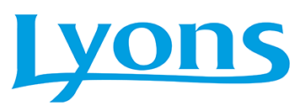


 Airborne dust particles can cause short term impact on mining productivity and long-term impacts on workers’ health. Safe to Work speaks to Lyons Airconditioning Services about how it combines its renowned Australian knowledge with Sy-Klone International’s cab air quality systems and air filtration products to lead the way in dust control and help mining companies meet ISO 23875, the soon to be published mining industry specific air quality standard.
Airborne dust particles can cause short term impact on mining productivity and long-term impacts on workers’ health. Safe to Work speaks to Lyons Airconditioning Services about how it combines its renowned Australian knowledge with Sy-Klone International’s cab air quality systems and air filtration products to lead the way in dust control and help mining companies meet ISO 23875, the soon to be published mining industry specific air quality standard.


 The Sy-Klone
The Sy-Klone
 Sy-Klone team is the leading working group currently piloting
Sy-Klone team is the leading working group currently piloting 
